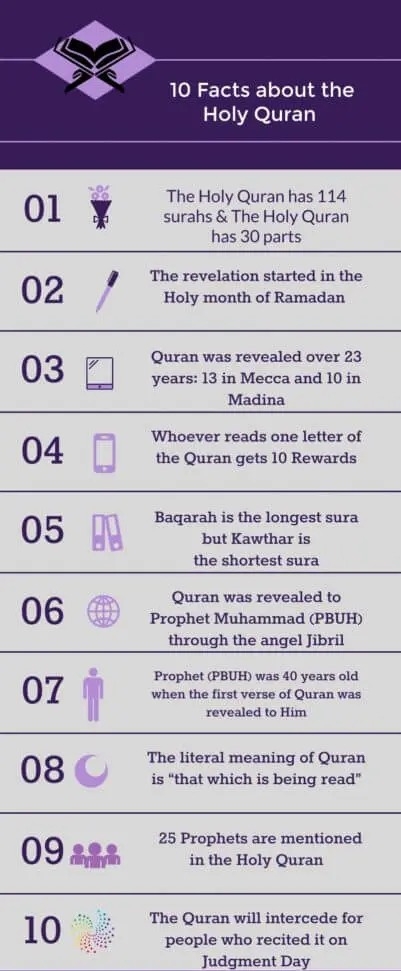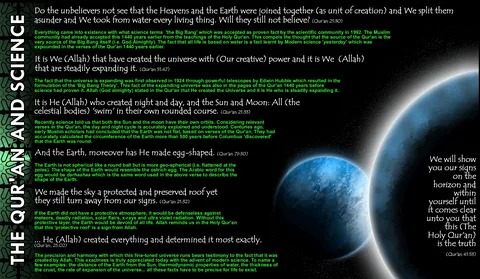The Holy Quran is the central religious text of Islam, believed by Muslims to be a revelation from God (Allah) to the Prophet Muhammad. It serves as a comprehensive guide for personal conduct, moral values, and social principles. in this article on Arabian Tongue we will delve into some intriguing facts about the Holy Quran that shed light on its significance and influence.
Facts About the Holy Quran

The Holy Quran, often referred to as the “Noble Quran,” is the foundation of Islamic faith and practice. It encapsulates guidance for all aspects of life, from spiritual devotion to social ethics, One of the most prominent facts that we will discover about the Qur’an:
- Historical Background of the Holy Quran: The Holy Quran was revealed to the Prophet Muhammad over a period of approximately 23 years, starting in 610 CE. It was revealed through the angel Gabriel and is divided into 114 chapters known as “Surahs.”
- Divine Revelation and Compilation: Muslims believe that the Quran is the literal word of God and was revealed to guide humanity. It was memorized and written down during the Prophet’s lifetime and later compiled into a single book.
- Unique Literary Style: The Quran’s language is known for its eloquence and unique literary style. Its verses use rhythmic patterns, metaphors, and analogies to convey complex spiritual and ethical concepts.
- Scientific Insights within the Quran: The Quran contains verses that touch upon various scientific phenomena, even though it is not a scientific textbook. These verses have been interpreted to align with modern scientific discoveries.
- Spiritual and Ethical Guidance: The Quran offers profound insights into spirituality and morality. It emphasizes virtues such as compassion, humility, and justice, guiding individuals to lead a righteous life.
- Language and Linguistic Beauty: The Arabic language of the Quran is considered unparalleled in its beauty and precision. Its eloquence is believed to be a sign of its divine origin.
- Miraculous Preservation: Unlike other ancient texts, the Quran has been preserved without alteration since its revelation. This preservation is seen as a miracle, ensuring the text’s authenticity.
- Universal Message of Peace: The Quran promotes peace, understanding, and harmony among people of different faiths and backgrounds. It advocates for resolving conflicts through dialogue and kindness.
- Numerical Miracles: Some scholars point to numerical patterns in the Quran’s text as a form of divine symbolism. These patterns are believed to reinforce the text’s significance.
- Quranic Manuscripts: Throughout history, beautifully crafted manuscripts of the Quran have been produced, showcasing intricate calligraphy and artistic designs.
- Interpretation and Exegesis: The Quran’s meanings are often interpreted through exegesis (Tafsir). Various scholars provide insights into the text’s deeper layers of understanding.
- Misconceptions and Clarifications: The Quran has faced misinterpretations and misconceptions over time. Proper context and scholarly guidance are crucial to understanding its true message.
- The First Surah in the Qur’an- Al-Fatiha: Boldly opening the Qur’an is Al-Fatiha, also known as “The Opening.” This surah is recited in every unit of the Muslim prayer, making it an integral part of daily worship. Al-Fatiha implores God for guidance along the straight path and seeks His mercy and compassion.
- The Longest Surah- Al-Baqarah: At over 280 verses, Al-Baqarah is the longest surah in the Qur’an. Its comprehensive nature covers various aspects of life, including laws, ethics, and guidance for personal conduct. This surah delves deep into the stories of past prophets, illustrating lessons that are timeless and universal.
- The Shortest Surah- Al-Kawthar: In contrast, Al-Kawthar is the shortest surah in the Qur’an, yet its brevity holds profound meaning. This surah celebrates the abundance of divine blessings and mercy bestowed upon Prophet Muhammad, serving as a reminder of the importance of gratitude.
- The Count of Surahs in the Qur’an: The Qur’an consists of precisely 114 surahs, each distinct in theme and purpose. This number holds spiritual significance, mirroring the number of chapters and verses in the Qur’an.
- Recitation and Memorization: The practice of reciting and memorizing the Quran is highly revered in Islamic culture. Many Muslims around the world commit the entire Quran to memory.
Modern Scientific Facts in the Quran

The Quran, the holy book of Islam, is revered not only for its spiritual guidance but also for its references to various scientific phenomena that were revealed over 1,400 years ago:
The Expanding Universe – A Cosmic Revelation
The Quran refers to the universe as “the heavens and the earth.” Centuries before the advent of modern cosmology, the Quran hinted at the concept of the expanding universe. In Surah Adh-Dhariyat (51:47), it is mentioned, “And the heaven We constructed with strength, and indeed, We are [its] expander.” This verse aligns with the Big Bang theory, which suggests that the universe originated from a singular point and has been expanding ever since.
Embryonic Development – Life’s Beginnings
The Quran contains detailed descriptions of human embryonic development, as seen in Surah Al-Mu’minun (23:12-14). It mentions the stages of conception, implantation, and fetal development, with astonishing accuracy. Modern embryology confirms these stages, underscoring the harmony between scientific discoveries and ancient revelations.
Recommend: The 5 Pillars of Islam.
Mountains as Stabilizers – Geological Insights
Surah An-Naba (78:6-7) describes mountains as pegs or stakes that stabilize the earth’s crust. This insight highlights the critical role mountains play in maintaining geological stability. Modern geology reveals that mountains indeed have deep roots within the Earth’s crust, preventing tectonic shifts and promoting stability.
Water’s Role in Life – An Essential Element
Water is essential for life, and the Quran acknowledges this fact in numerous verses. Surah Al-Anbiya (21:30) mentions, “And We made from water every living thing.” This recognition of water’s fundamental role in sustaining life resonates with modern biological understanding.
The Water Cycle – A Divinely Orchestrated Process
The Quran presents the concept of the water cycle in Surah Az-Zumar (39:21): “Do you not see that Allah sends down rain from the sky and makes it flow as springs [and rivers]?” This description of the continuous cycle of evaporation, condensation, and precipitation aligns with our contemporary understanding of the water cycle.
Orbiting Celestial Bodies – Pulsars and Stars
The Quran refers to celestial bodies and their orbits in Surah Al-Anbiya (21:33): “And it is He who created the night and the day and the sun and the moon; all [heavenly bodies] swim along, each in an orbit.” This notion of orbiting bodies mirrors our knowledge of planets, stars, and even pulsars following specific orbital paths.
Learn Now: Online Quran Classes.
FAQs
Is the Quran available in languages other than Arabic?
Yes, translations of the Quran are available in numerous languages to make its teachings accessible to non-Arabic speakers.
Are there variations in the Quran's text?
No, the Quran's text has remained consistent throughout history, without any variations or alterations.
What is the significance of memorizing the entire Quran?
Memorization of the Quran is considered a virtuous practice, showcasing dedication to the scripture's teachings.
How do Muslims approach the scientific references in the Quran?
Muslims view the Quran's references to science as signs of its divine wisdom, complementing their faith in God's creation.
What role does the Quran play in Islamic jurisprudence?
The Quran serves as the primary source of guidance in Islamic law, forming the basis for ethical and legal decisions.
Conclusion
The Holy Quran stands as a timeless guide, offering wisdom, solace, and ethical direction to millions of believers worldwide. Its influence spans beyond religious boundaries, inspiring individuals to lead lives of purpose and compassion.


